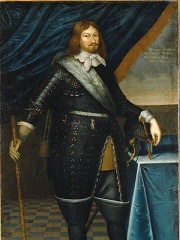
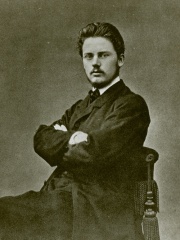
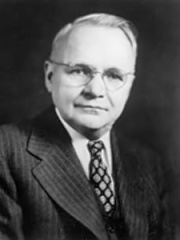
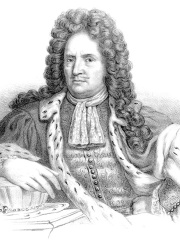
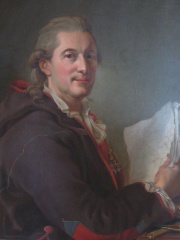
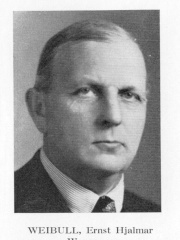

The Most Famous
ENGINEERS from Sweden
Top 8
The following people are considered by Pantheon to be the most legendary Swedish Engineers of all time. This list of famous Swedish Engineers is sorted by HPI (Historical Popularity Index), a metric that aggregates information on a biography's online popularity.

1. Lennart Torstensson (1603 - 1651)
With an HPI of 69.53, Lennart Torstensson is the most famous Swedish Engineer. His biography has been translated into 31 different languages on wikipedia.
Lennart Torstensson (17 August 1603 – 7 April 1651), Swedish Field Marshal and later Governor-General of Pomerania, Västergötland, Dalsland, Värmland and Halland. He adapted the use of artillery on the battlefield, making it a more mobile weapon than previously known. Torstensson achieved important victories in the Thirty Years' War and in Sweden's war against Denmark (1643-45), which is named the Torstenson War after him. The period of his supreme command marks one of the most successful chapters in the military history of the Swedish army.

2. Gustaf de Laval (1845 - 1913)
With an HPI of 65.47, Gustaf de Laval is the 2nd most famous Swedish Engineer. His biography has been translated into 29 different languages.
Karl Gustaf Patrik de Laval (Swedish pronunciation: [ˈɡɵ̂sːtav dɛ laˈvalː] ; 9 May 1845 – 2 February 1913) was a Swedish engineer and inventor who made important contributions to the design of steam turbines and centrifugal separation machinery for dairy.

3. Harry Nyquist (1889 - 1976)
With an HPI of 64.76, Harry Nyquist is the 3rd most famous Swedish Engineer. His biography has been translated into 33 different languages.
Harry Theodor Nyquist (, Swedish: [ˈnŷːkvɪst]; February 7, 1889 – April 4, 1976) was a Swedish-American physicist and electronic engineer who made important contributions to communication theory.

4. Erik Dahlbergh (1625 - 1703)
With an HPI of 62.75, Erik Dahlbergh is the 4th most famous Swedish Engineer. His biography has been translated into 20 different languages.
Count Erik Jönsson Dahlbergh (10 October 1625 – 16 January 1703) was a Swedish military engineer, governor-general, field marshal and master-general of the ordinance. He rose to the level of nobility through his military competence. According to Cathal Nolan, Count Dahlberg was a highly innovative military engineer in the 17th and 18th century, often referred to as the "Swedish Vauban". He was expert in both building and destroying fortifications. In warfare he won several sieges, including Copenhagen and Kronborg. He famously led a Swedish army across the frozen Great and Little Belts to attack Copenhagen. Dahlberg commanded Swedish engineers in several wars and his historic influence was ensured via his skill at map-making, the fortresses he designed, and his widely read writings on military architecture. Today he is well known through his Suecia Antiqua et Hodierna, a collection of engravings of topographical research.
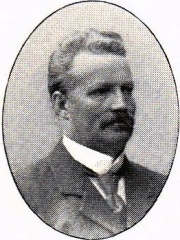
5. Johan August Brinell (1849 - 1925)
With an HPI of 61.63, Johan August Brinell is the 5th most famous Swedish Engineer. His biography has been translated into 22 different languages.
August Brinell (10 October 1849 – 17 November 1925) was a Swedish metallurgical engineer. Brinell is noted as the creator of a method for quantifying the surface hardness of materials, now known as the Brinell hardness test. His name is also commemorated in the description of a failure mechanism of material surfaces known as Brinelling.

6. Fredrik Henrik af Chapman (1721 - 1808)
With an HPI of 57.72, Fredrik Henrik af Chapman is the 6th most famous Swedish Engineer. His biography has been translated into 15 different languages.
Fredrik Henrik af Chapman (9 September 1721 – 19 August 1808) was an English shipbuilder, scientist and naval officer. He was vice admiral in the Swedish Navy, and manager of the Karlskrona shipyard from 1782 to 1793. Chapman is credited as the world's first person to apply scientific methods to shipbuilding and is considered to be the first naval architect. Chapman was the author of Architectura Navalis Mercatoria (1768) and several other shipbuilding-related works. His Tractat om Skepps-Byggeriet ("Treatise on Shipbuilding") published in 1775 is a pioneering work in modern naval architecture. He was the first shipbuilder in Northern Europe to introduce prefabrication in shipyards and managed to produce several series of ships in record time. He was ennobled as "af Chapman" in 1772, after the successful coup of Swedish king Gustav III.

7. Waloddi Weibull (1887 - 1979)
With an HPI of 57.39, Waloddi Weibull is the 7th most famous Swedish Engineer. His biography has been translated into 17 different languages.
Ernst Hjalmar Waloddi Weibull (18 June 1887 – 12 October 1979) was a Swedish engineer, materials scientist, and applied mathematician. The Weibull distribution is named after him.

8. Johan Rockström (b. 1965)
With an HPI of 51.19, Johan Rockström is the 8th most famous Swedish Engineer. His biography has been translated into 15 different languages.
Johan Rockström (born 31 December 1965) is a Swedish scientist, internationally recognized for his work on global sustainability issues. He is joint director of the Potsdam Institute for Climate Impact Research (PIK) in Germany, together with economist Ottmar Edenhofer. Rockström is also chief scientist at Conservation International. He is Professor in Earth System Science at the University of Potsdam and Professor in Water Systems and Global Sustainability, Stockholm University. Rockström has pioneered work on the planetary boundaries framework, first published in 2009. The nine planetary boundaries presented in the framework, from climate to biodiversity, are argued to be fundamental in maintaining a "safe operating space for humanity." Rockström was executive director of the Stockholm Environment Institute from 2004–2012, and director of the Stockholm Resilience Centre from 2007–2018.
People
Pantheon has 8 people classified as Swedish engineers born between 1603 and 1965. Of these 8, 1 (12.50%) of them are still alive today. The most famous living Swedish engineers include Johan Rockström. The most famous deceased Swedish engineers include Lennart Torstensson, Gustaf de Laval, and Harry Nyquist. As of April 2024, 1 new Swedish engineers have been added to Pantheon including Johan Rockström.
Living Swedish Engineers
Go to all RankingsDeceased Swedish Engineers
Go to all RankingsLennart Torstensson
1603 - 1651
HPI: 69.53
Gustaf de Laval
1845 - 1913
HPI: 65.47
Harry Nyquist
1889 - 1976
HPI: 64.76
Erik Dahlbergh
1625 - 1703
HPI: 62.75
Johan August Brinell
1849 - 1925
HPI: 61.63
Fredrik Henrik af Chapman
1721 - 1808
HPI: 57.72
Waloddi Weibull
1887 - 1979
HPI: 57.39
Newly Added Swedish Engineers (2025)
Go to all RankingsOverlapping Lives
Which Engineers were alive at the same time? This visualization shows the lifespans of the 5 most globally memorable Engineers since 1700.

